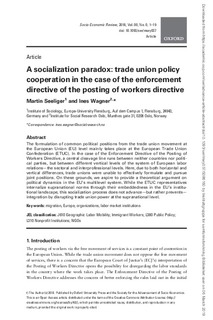| dc.contributor.author | Seeliger, Martin | |
| dc.contributor.author | Wagner, Ines | |
| dc.date.accessioned | 2019-03-07T07:52:06Z | |
| dc.date.available | 2019-03-07T07:52:06Z | |
| dc.date.created | 2018-12-17T10:00:52Z | |
| dc.date.issued | 2018 | |
| dc.identifier.issn | 1475-1461 | |
| dc.identifier.uri | http://hdl.handle.net/11250/2589091 | |
| dc.description.abstract | The formulation of common political positions from the trade union movement at the European Union (EU) level mainly takes place at the European Trade Union Confederation (ETUC). In the case of the Enforcement Directive of the Posting of Workers Directive, a central cleavage line runs between neither countries nor political parties, but between different vertical levels of the system of European labor relations—the sectoral and interprofessional levels. Here, due to both horizontal and vertical differences, trade unions were unable to effectively formulate and pursue joint positions. On these grounds, we aspire to provide a theoretical argument on political dynamics in the EU’s multilevel system. While the ETUC representatives internalize supranational norms through their embeddedness in the EU’s institutional landscape, this socialization process does not advance—but rather prevents—integration by disrupting trade union power at the supranational level. | |
| dc.description.abstract | A socialization paradox: trade union policy cooperation in the case of the enforcement directive of the posting of workers directive | |
| dc.language.iso | eng | |
| dc.title | A socialization paradox: trade union policy cooperation in the case of the enforcement directive of the posting of workers directive | |
| dc.type | Peer reviewed | |
| dc.type | Journal article | |
| dc.description.version | publishedVersion | |
| dc.source.journal | Socio-Economic Review | |
| dc.identifier.doi | 10.1093/ser/mwy037 | |
| dc.identifier.cristin | 1643869 | |
| cristin.unitcode | 7437,0,0,0 | |
| cristin.unitname | Institutt for samfunnsforskning | |
| cristin.ispublished | true | |
| cristin.fulltext | original | |
| cristin.qualitycode | 1 | |
